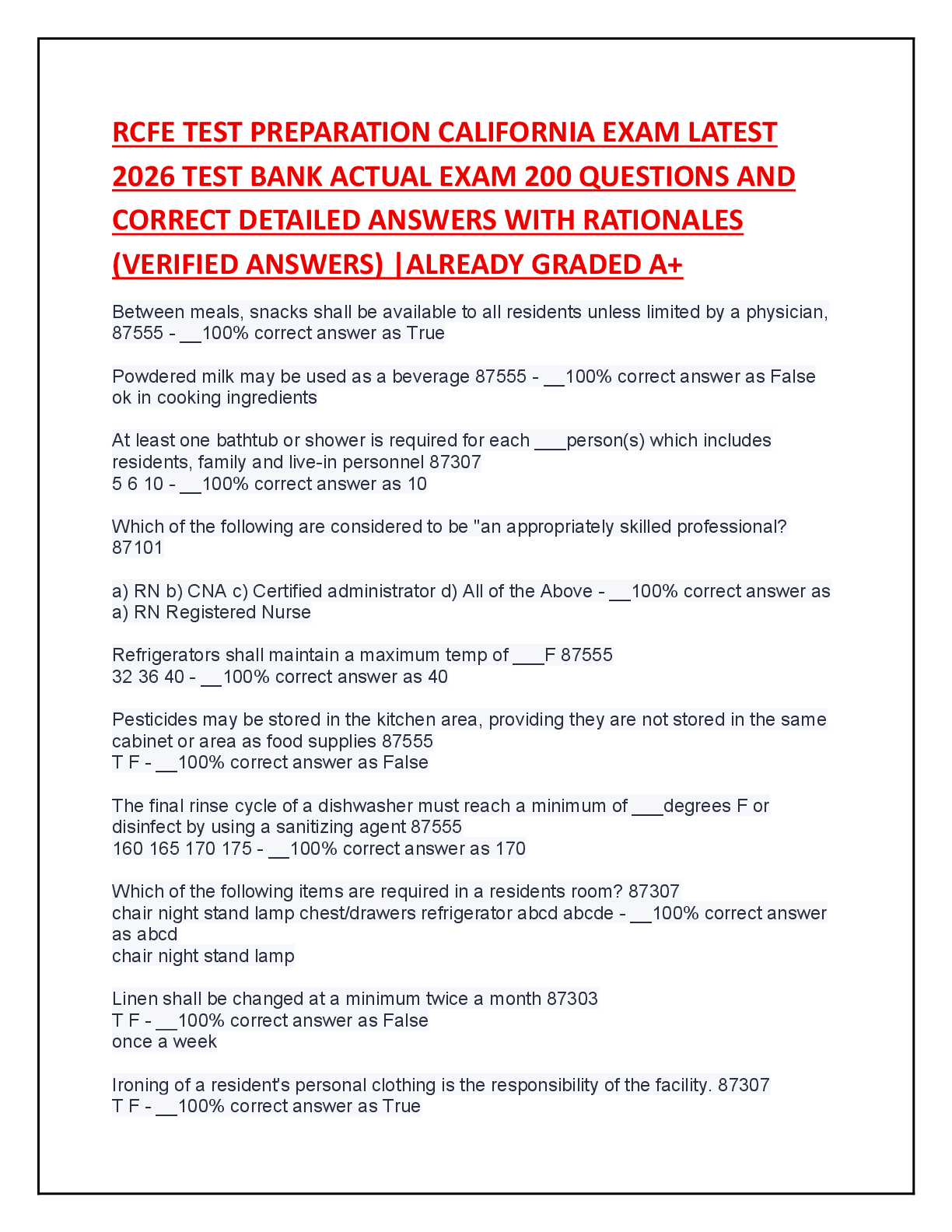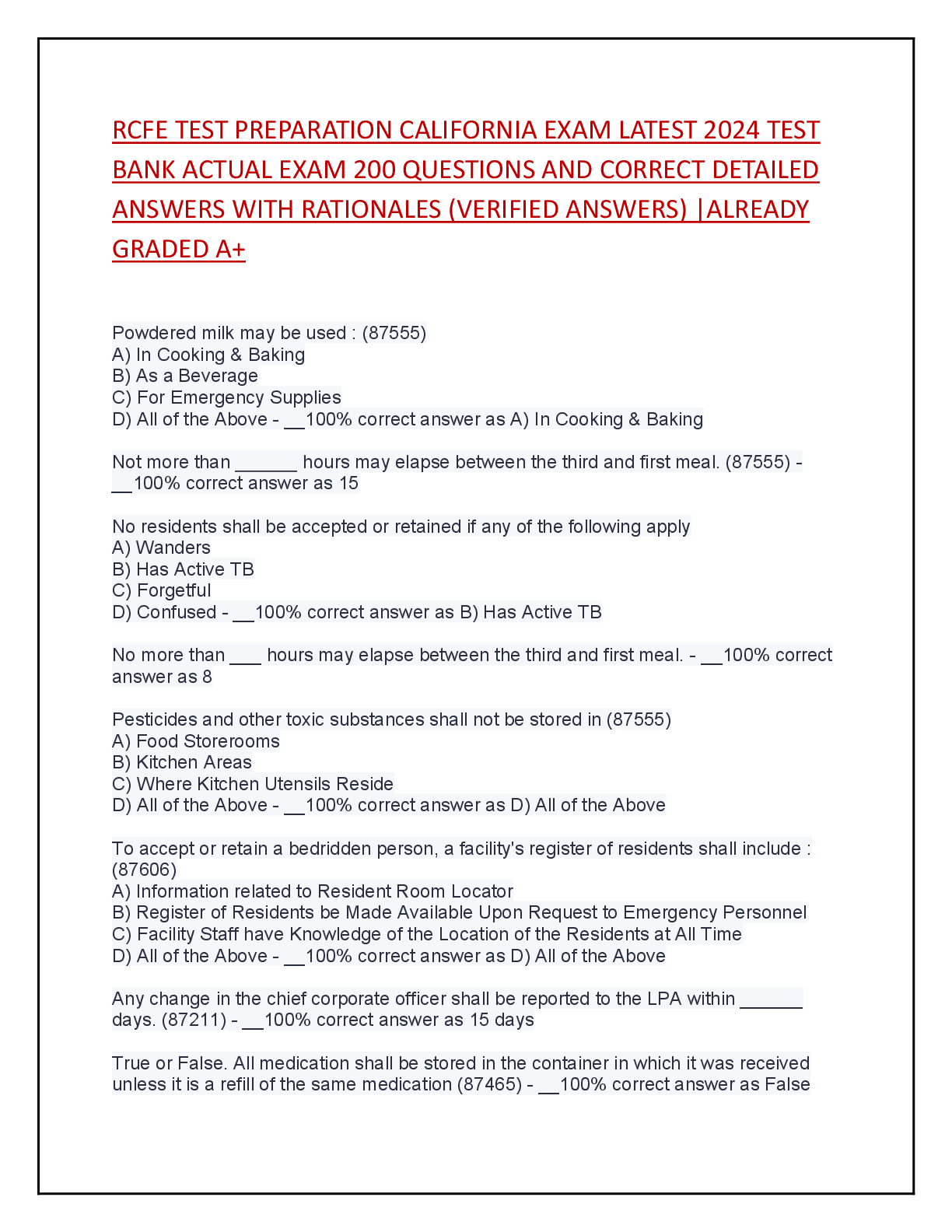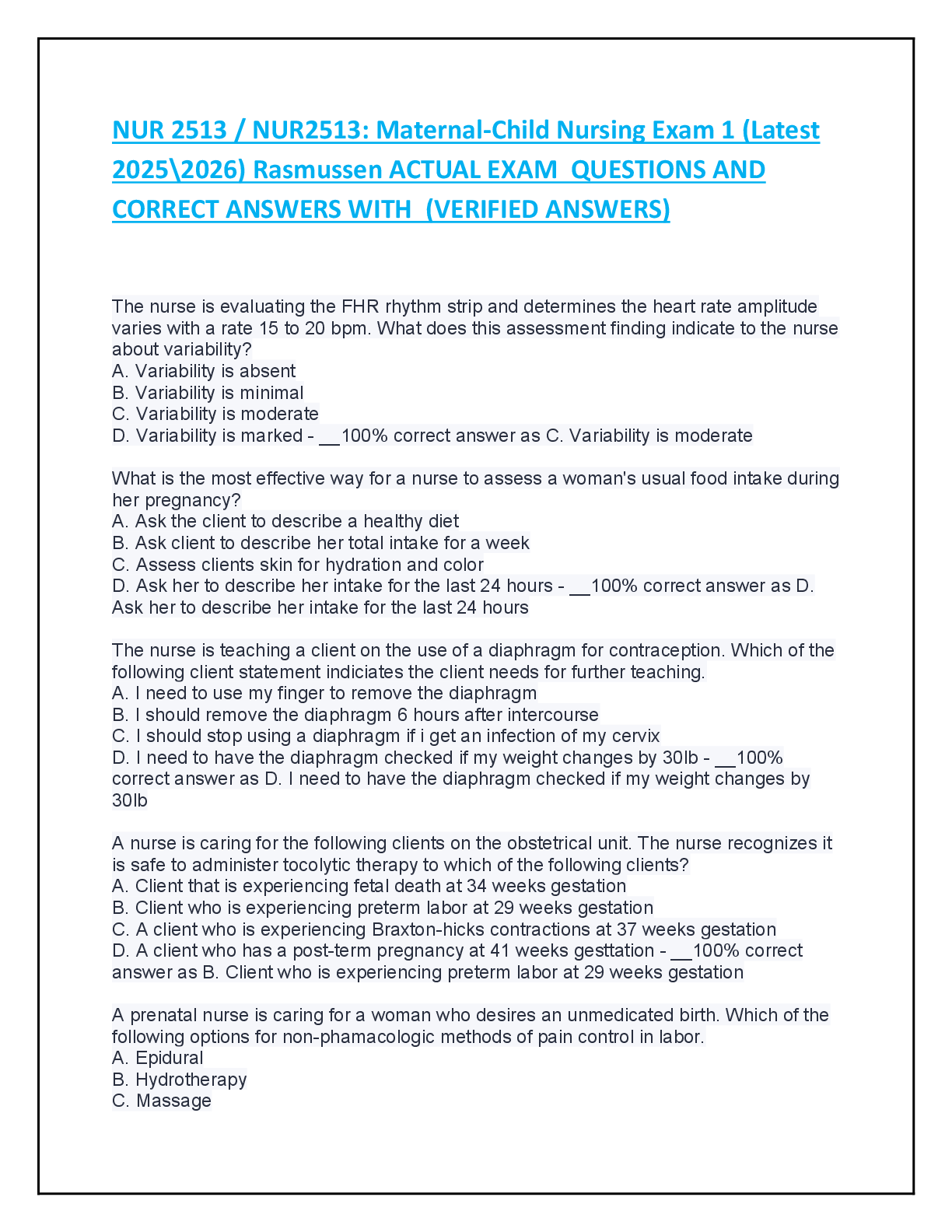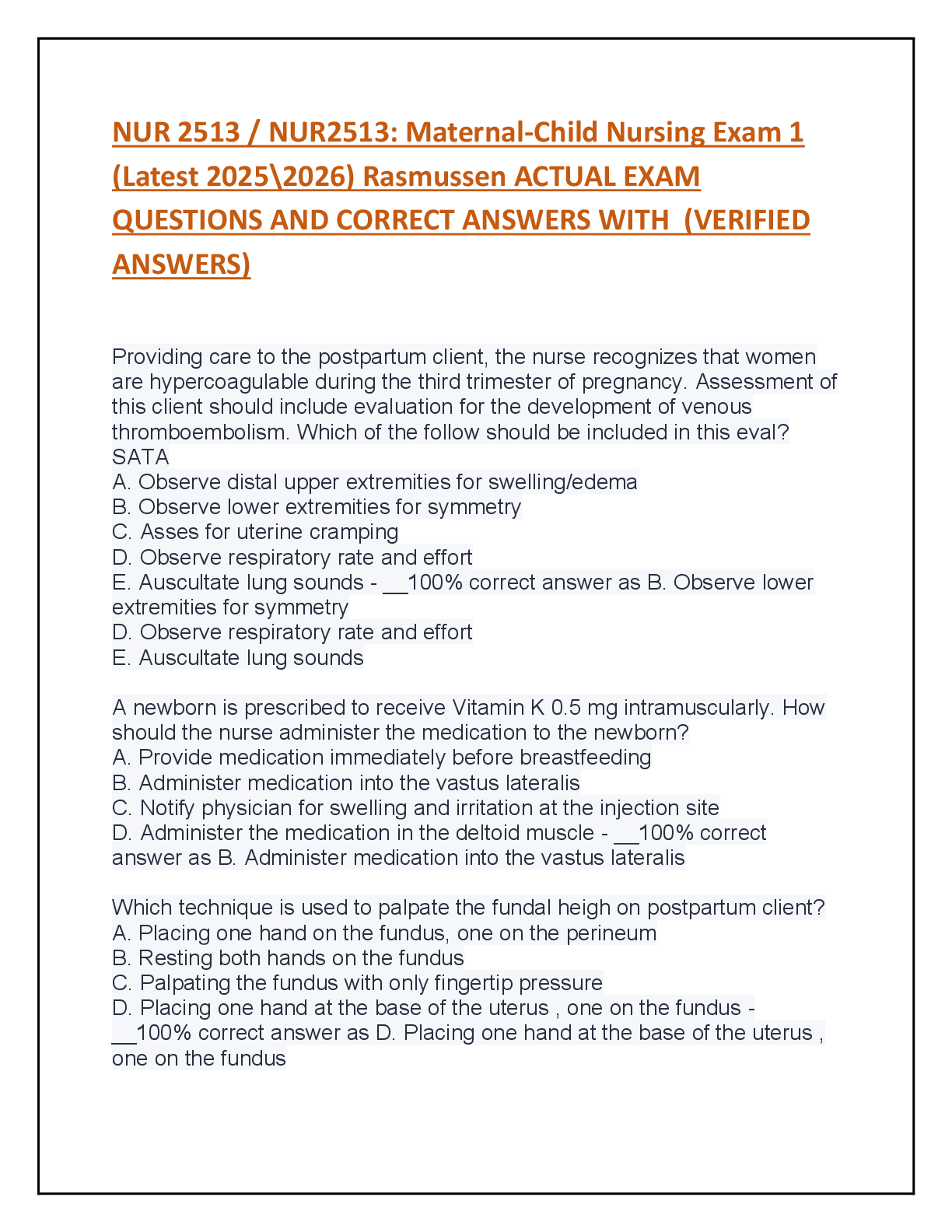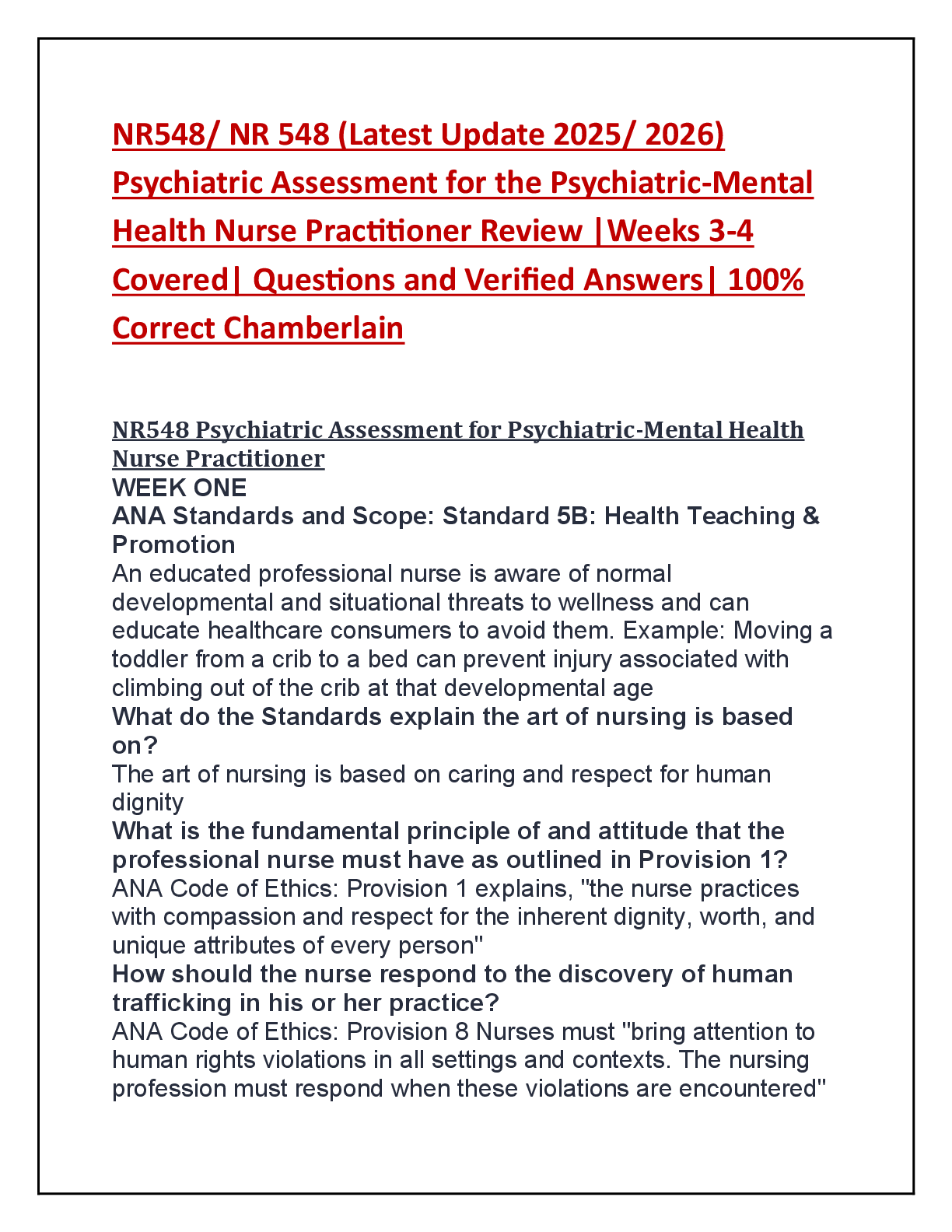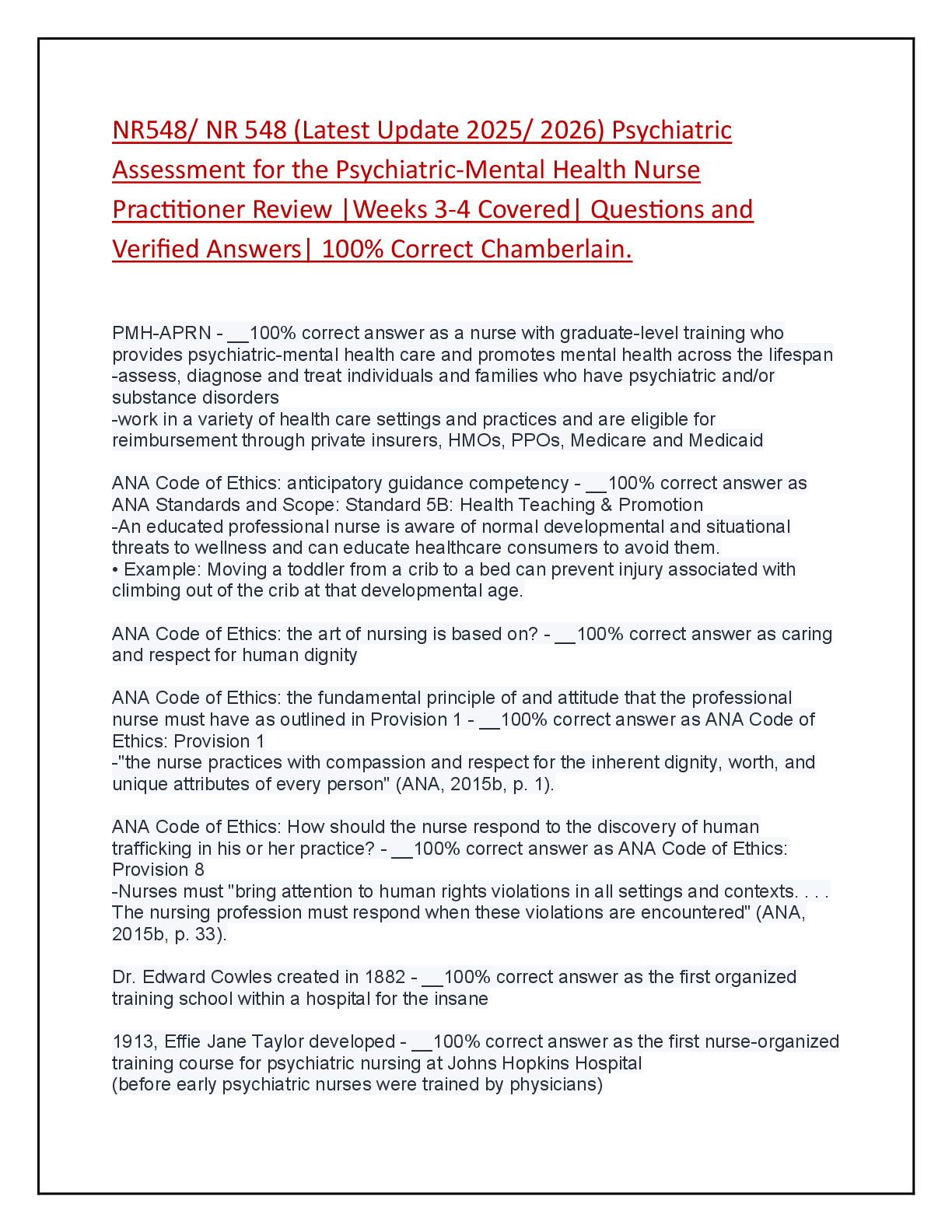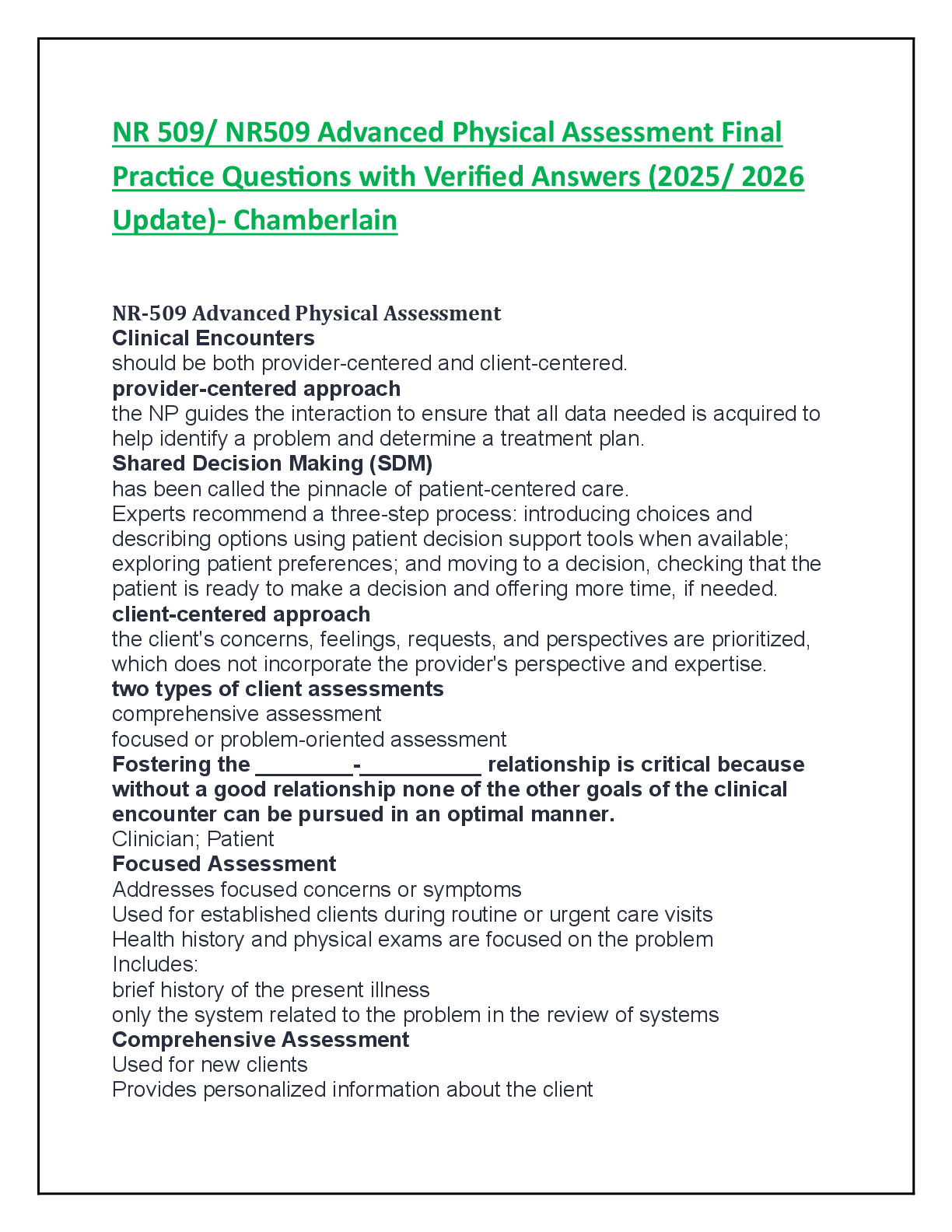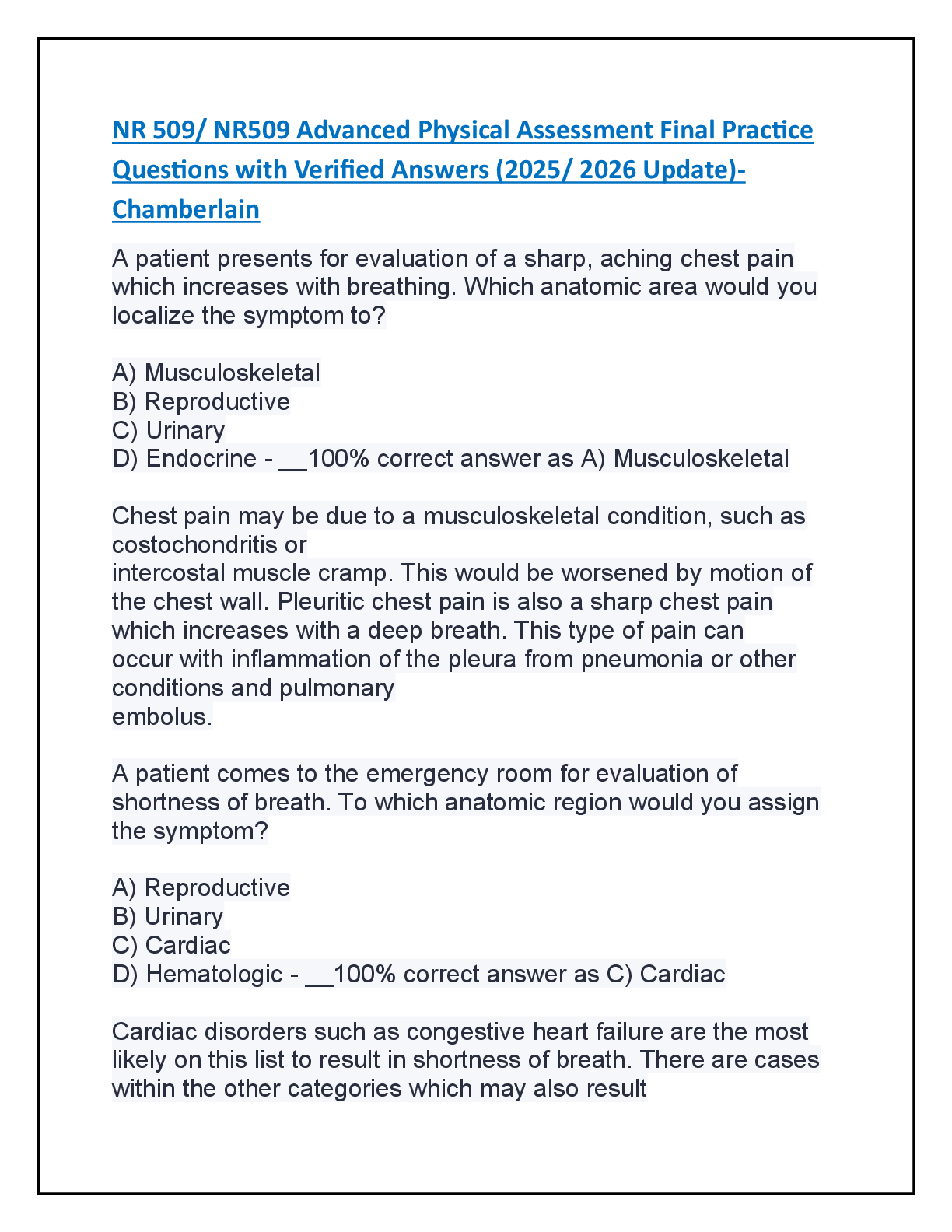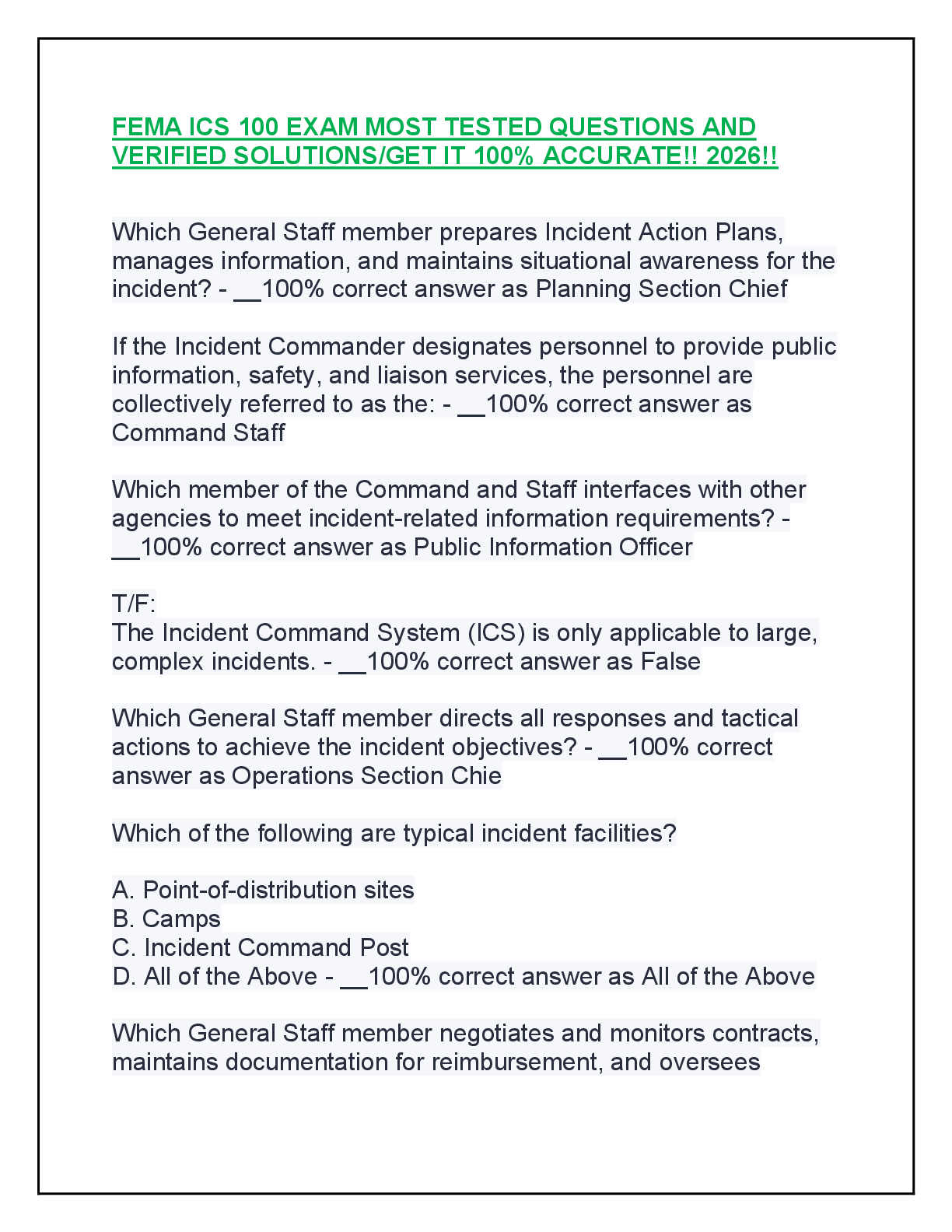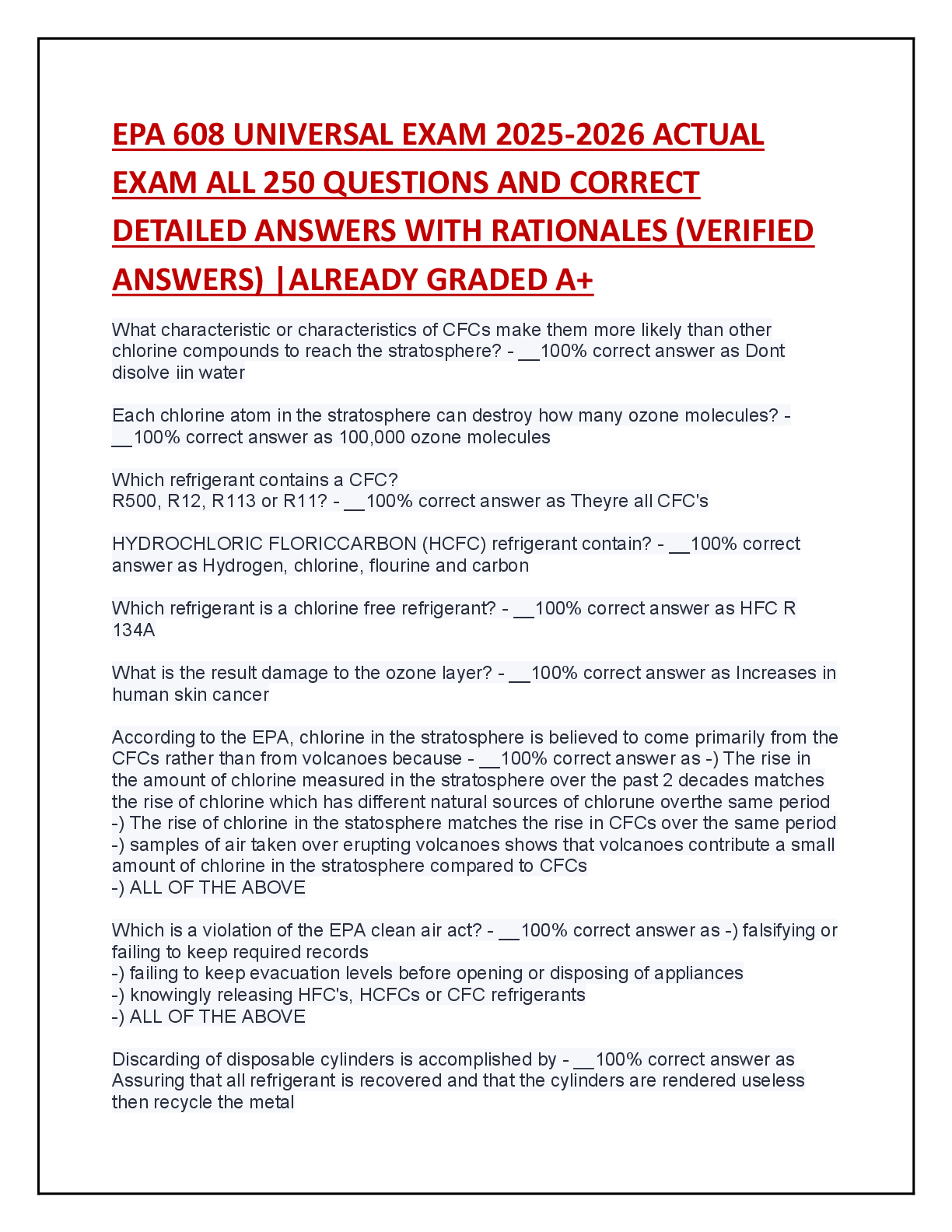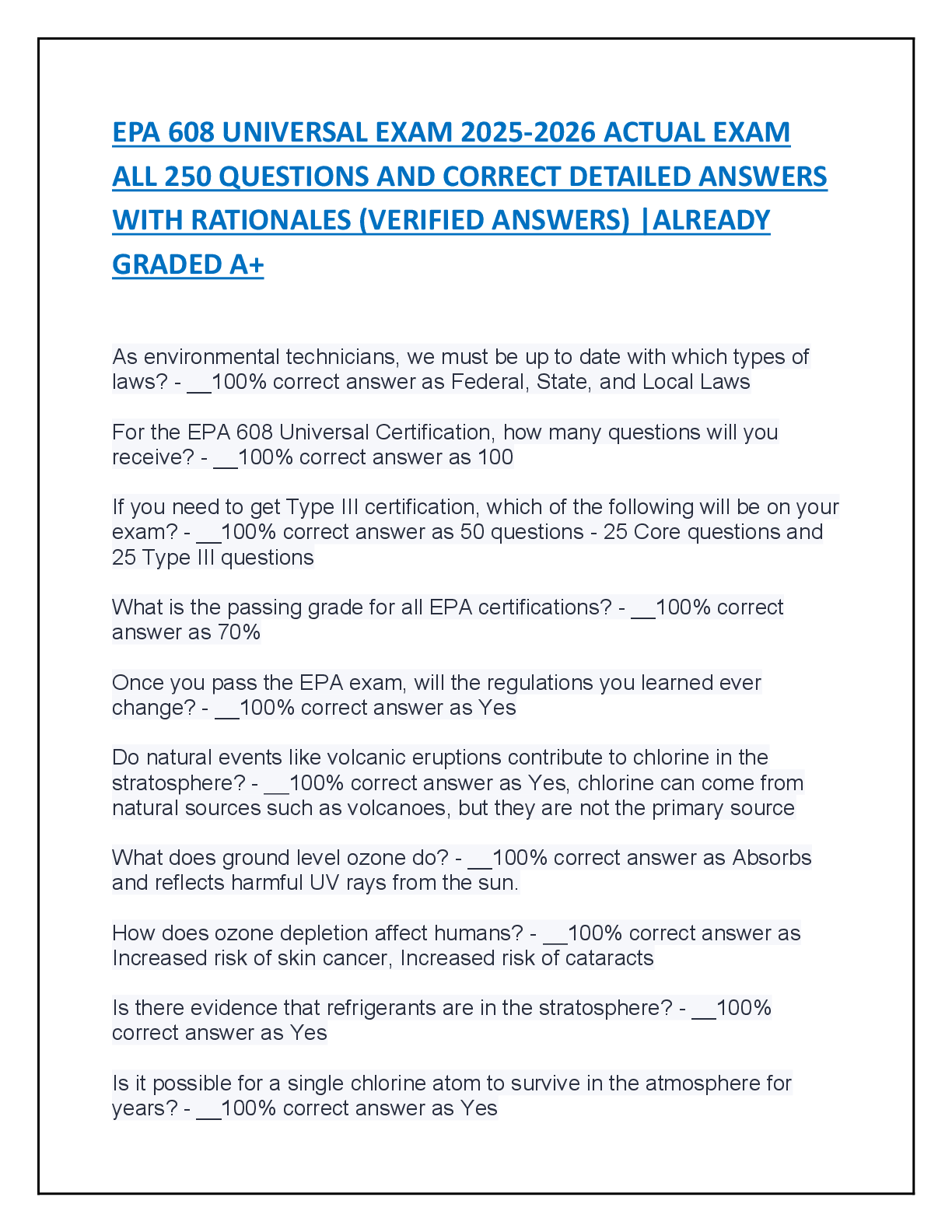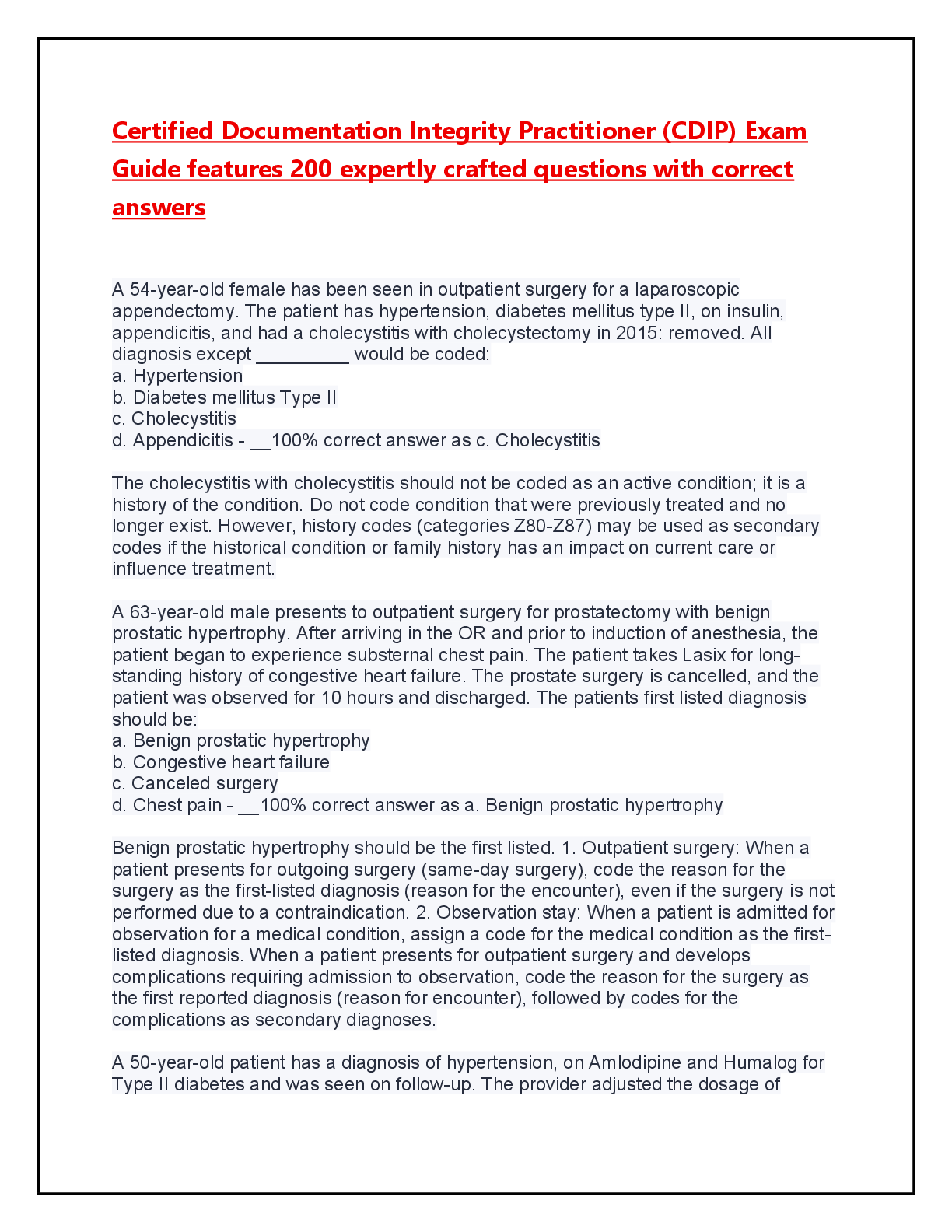Political Science > EXAM > POLS 2311 / POLS2311 pre test chapters 1 & 2 (All)
POLS 2311 / POLS2311 pre test chapters 1 & 2
Document Content and Description Below
Ch 1 pre-test Question 1 The foreign-born population in the United States reached an all-time low of 5 percent in 1970 because the Constitution was amended to eliminate naturalization and pro ... vide citizenship only to people born within the United States. federal government chose to deport nearly all foreign-born residents after World War II. struggling American economy made the United States an unattractive destination for most immigrants. National Origins Quota System placed strong restrictions on the number of immigrants who could enter the United States. Question 2 Generally speaking, in order to be a good citizen in the United States, it is most critical to have a lot of corporate connections. significant resources, such as money. knowledge of the American political system. strongly held convictions. Question 3 The right of each citizen to vote is an example of equality of opportunity. equality of result. political equality. educational opportunity. Question 4 The Declaration of Independence defined which three inalienable rights? “Life, Liberty and Equality” “Life, Liberty and the pursuit of Happiness” “Liberty, Equality and Fraternity” “Life, Equality and the pursuit of Happiness” Question 5 “Digital citizenship” is the ability to participate in society online. the constitutional right to vote in federal elections using the internet. a new government program designed to deliver daily legislative updates to citizens via email. the federal government’s recent initiative to allow immigrants to complete citizenship forms electronically. Question 6 What major legal and political changes led to the rise of constitutional government in the West? legal limits on government and the right of more people to vote the right of revolution and the spread of socialism debt relief for the poor and the right of average citizens to hold office the growth in ethnic and religious diversity Question 7 After the Civil War, Republicans attempted to ________ in order to maintain Republican control over the defeated southern states. disenfranchise newly freed slaves enfranchise newly freed slaves disenfranchise all property-owning whites enfranchise women Question 8 Government is best defined as the institutions and procedures by which a territory and its people are ruled. set of political principles and values that guide political life. means by which wealth is redistributed. invisible hand that turns private interests into public goods. Question 9 Politics can be defined as conflicts over the character, membership, and policies of government. the informal, private organizations through which a land and its people are ruled. a hierarchically structured organization that is designed to distribute labor among several different groups of people. a line-and-staff organization that is designed to facilitate control over complex social arrangements. Question 10 A representative democracy is a system of government that allows citizens to vote directly on laws and policies. allows citizens to make, veto, or judge statutes personally. gives citizens a regular opportunity to elect government officials. gives citizens the ability to debate important constitutional decisions. Question 11 The belief that citizens can influence what government does is called political efficacy. political saliency. popular sovereignty. autocracy. Question 12 “One person, one vote” reflects the principle of political equality. equality of opportunity. majority rule. popular sovereignty. Question 13 Direct democracy is best defined as the system of government run by one person. a system that allows citizens to vote directly for laws and policies. the competition between interest groups for governmental power. a system that allows citizens to elect representatives who play a significant role in governmental decision making. Question 14 A government that is not constrained by legal limits and also seeks to eliminate any challenges to its authority is known as a(n) ________ government. authoritarian totalitarian democratic republican Question 15 The ________ was the key group in Europe that pushed for limited government. bourgeoisie gendarmes peasantry Socialist Party Question 16 Citizenship refers to the process of providing passive consent for government’s activities. the act of paying taxes to the government. informed and active membership in a political community. receiving benefits from government programs. Question 17 A government that is formally limited by laws and rules is called democratic. constitutional. oligarchic. totalitarian. Question 18 ________ described politics as “who gets what, when, and how.” James Madison Abraham Lincoln Harold Lasswell John Locke Question 19 The belief that political authority should rest with the people themselves is called political equality. pluralism. popular sovereignty. federalism. Question 20 ________ are the three core values in American politics. Liberty, equality, and democracy Democracy, patriotism, and the rule of law Equality, oligarchy, and free enterprise Anarchy, equality, and patriotism Ch 2 pre-test Question 1 The Virginia Plan proposed a system of representation in the national legislature that was based on equal representation between the states. the concept of universal suffrage. the population of each state or the proportion of each state’s revenue contribution, or both. the strength of each state’s militia. Question 2 Which political philosopher wrote that life in a government-less state of nature would be “solitary, poor, nasty, brutish, and short”? Montesquieu Locke Hobbes Aristotle Question 3 Who were the authors of the Federalist Papers? James Madison, John Jay, and Alexander Hamilton John Adams, Benjamin Franklin, and Thomas Jefferson Charles Beard, Daniel Shays, and Paul Revere James Madison, John Adams, and Thomas Jefferson Question 4 Judicial review is the power of the courts to decide on the constitutionality of actions taken by the other branches of government. Congress to review the decisions of the federal courts. the states to review the constitutionality of federal actions and laws. the courts to review and edit pieces of legislation before they are voted on in Congress. Question 5 Colonial protesters of the Stamp Act and the Sugar Act rallied around which slogan? “No taxation without representation” “Give me liberty or give me death” “A house divided against itself cannot stand” “Don’t tread on me” Question 6 The president’s power to veto a bill passed by Congress is a good example of separation of powers. federalism. checks and balances. civil liberties. Question 7 What is the term length of a federal judge? two years four years six years barring impeachment, life Question 8 Bicameralism is a constitutional principle that represents the division of the national government into two branches. the powers of the executive branch between two individuals: the president and the vice president. the legislature into two chambers. the federal court system into two levels: the Supreme Court and the appellate courts. Question 9 The Three-Fifths Compromise determined that three out of every five slaves would be counted for purposes of representation. determined the ratio between free states and slave states. declared that the states would pay three-fifths of the Revolutionary War debt and the federal government would pay the rest. determined that all American citizens would pay three-fifths of their incomes to the federal government in taxes every year. Question 10 The United States’ first written constitution was called the Magna Carta. Bill of Rights. Articles of Confederation. Declaration of Independence. Question 11 The system of shared powers, divided between a central government and the state governments, is called the electoral college. federalism. checks and balances. the separation of powers. Question 12 The three political philosophers whose ideas exerted the greatest influence on the Founders were Rousseau, Nietzsche, and Foucault. Marx, Lenin, and Trotsky. Lincoln, Washington, and Jefferson. Hobbes, Locke, and Montesquieu. Question 13 Shays’s Rebellion was significant because it convinced many observers that the government under the Articles of onfederation had become dangerously ineffieient and indecisive. started the Revoluntionary War. persuaded many colonists that slavery should be outlawed in the Constitution. convinced Congress to approve the Louisiana Purchase. Question 14 The events that led to the Revolutionary War were triggered by which of the following? The British raised revenue by increasing the tax rate of the colonies. The British had established suspicious alliances with Indian tribes during the French and Indian War. American separatists assassinated King George III. The British attempted to end slavery in the colonies. Question 15 The three branches of government created by the Constitution are constitutional, elected, and appointed. executive, legislative, and judicial. federal, state, and local. military, courts, and bureaucracy. Question 16 During the ratification debates, who were the Federalists? those who opposed the new Constitution because they wanted a weaker national government those who opposed the Constitution because it did not create a strong enough central government those who opposed the Constitution because it did not provide women with the right to vote those who supported the Constitution because it contained a strong national government Question 17 The issue of representation was addressed in the Great Compromise by giving each state the opportunity to elect its own governors. an equal number of senators but linking representation in the House of Representatives to population. an equal number of votes in the Electoral College. a veto over constitutional amendments. Question 18 During the ratification debates, who were the Antifederalists? those who opposed the new Constitution because they wanted a weaker central government those who opposed the Constitution because it did not create a strong enough central government those who opposed the Constitution because it contained a strong national government those who believed that the United States should enter into a confederation with Britain and Canada Question 19 Montesquieu called ________ the principle of giving each branch of government its own constituency. tyranny democracy a mixed regime a republic Question 20 The framers designed the Senate to be a check against excessive democracy by doing which of the following? Senators were originally appointed by state legislatures. Senators have shorter terms than members of the House of Representatives. Senators are directly elected by the people. Senators are the only officials immune from impeachment. [Show More]
Last updated: 3 years ago
Preview 1 out of 11 pages

Buy this document to get the full access instantly
Instant Download Access after purchase
Buy NowInstant download
We Accept:

Reviews( 0 )
$13.00
Can't find what you want? Try our AI powered Search
Document information
Connected school, study & course
About the document
Uploaded On
Dec 16, 2020
Number of pages
11
Written in
All
Additional information
This document has been written for:
Uploaded
Dec 16, 2020
Downloads
0
Views
123












